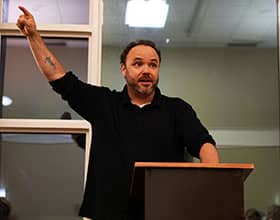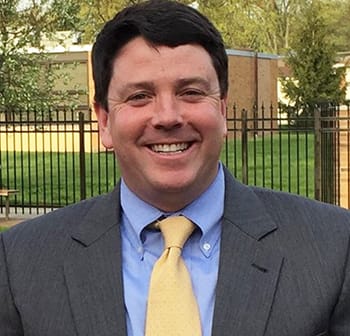Speaker criticizes pharmaceutical giants
Speaker Lawson slams pharmaceutical giants on drug prices

Alex Lawson speaks in the Farrell Room at Saint Michel’s College on December 4. (photos by Danielle Joubert ’20)
Alex Lawson, executive director of Social Security Works, explained why he thinks drug costs in America are so high. During his lecture on Wednesday December 4 2019 at 7 p.m. in the Farrell Room at Saint Michael’s College, Lawson came down hard on the pharmaceutical industry.
The speaker, who lives and works in Washington, DC, started out with three simple reasons why drug costs in America are so high: greed, profit, and corruption. According to Lawson, greed drives the high prices, and profits drive the corruption. They work together to create “a system that has been built to loot the people,” Lawson said. He then explained how we have come to pay so much for drugs that we should own given that taxpayer money funds the research that creates them.
“Almost all of the initial research that goes into developing molecules are publicly funded,” Lawson says. “New research by Aaron Kesselheim at Harvard shows that one in four drugs in late stage development is publicly funded. That means that for around a quarter of the drugs, we actually pay for them from start to finish, and then we take the patent and we just give it to a corporation.”
Corporations then proceed to charge outrageous amounts of money for drugs whose creation the public has funded, the speaker said. Lawson then described the methods drug companies use to set these prices: “Here’s what they do: they figure out what price is going to kill just a few people, so that everyone else is terrified enough that they’ll go bankrupt paying for the drugs that they need.”
He offered the example of insulin to prove this point. “Every month or so we see a new news story about a 26- or 27-year-old who dies because they’re rationing their insulin,” Lawson said. He explained that in rationing insulin, these young adults are also rationing the amount of food they’re eating, because you can only eat a certain amount based on how much insulin you have.
“So people who are dying because they’re rationing their insulin are literally starving themselves to stretch this drug that they need every day to live,” Lawson says. “Pharma looks at that and says that’s a great place to make money: We’ve got a captive audience, and we’re going to find the price point where we get a few stories, a few deaths, but not enough that anyone is going to actually do anything about it. That’s the sociopathy that’s driving these corporations.”
Lawson then got into the corruption of pharmaceutical companies, explaining how they use “patent thicketing” to block competition from generic companies: “Pharmaceutical corporations are the most innovative companies that have ever existed. The problem is all they innovate in is how to extend the life of their patents. They are amazing at coming up with new, creative ways to extend their monopolies so they can keep charging outrageous amounts of money.” They make so much money, Lawson says, that they have infinite resources to protect their monopolies, and can pay a fraction of their profits to politicians so that they control the policy making process as well.
So what steps need to be taken in the path forward to change? Lawson said that it won’t happen through market pressure because these are monopolies, not market goods. It also won’t come from the goodness of the hearts of those in charge of these monopolies, and it won’t come through enforcement of current laws that aren’t being enforced. Lawson argued that we need an entirely new system composed of new laws so that when a person becomes sick and needs a drug, he or she can get that drug.
One method to bring change, according to Lawson, is to use compulsory licensing. “Compulsory licensing says if your prices are so high that people can’t access the drug, you’re going to lose the patent, and we’re going to issue a compulsory license and allow other companies to come in and produce the drug,” Lawson said. He argued that compulsory licensing needs to be made very common so that big drug companies get the message and begin lowering their prices out of fear of losing their patents. Other steps toward solving the problem include public manufacturing and public research and development (R&D).
"Almost all of the initial research that goes into developing molecules is publicly funded...”





